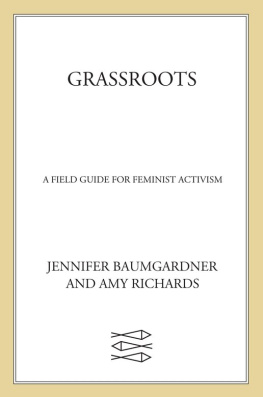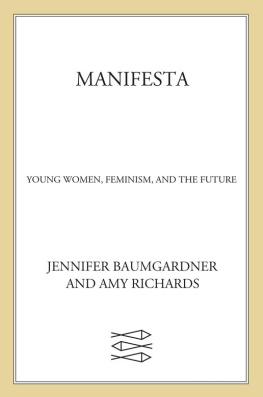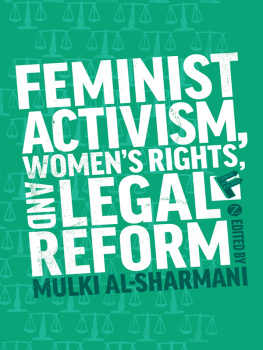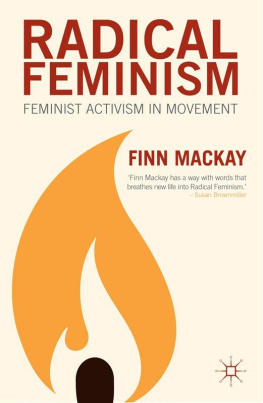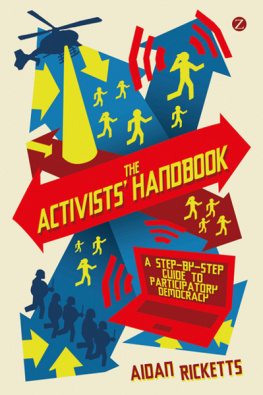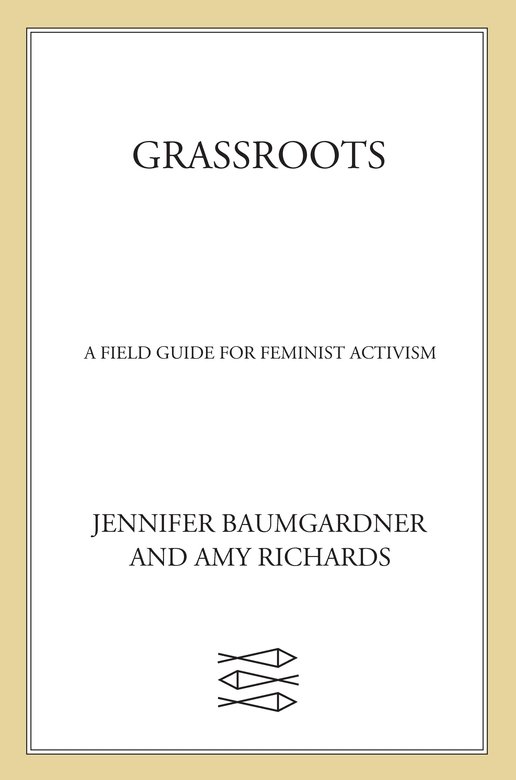We were lucky to have a near constant stream of young, smart, stylish, and hardworking women who reached out to us to be interns. Our gratitude goes to Jackie Arcy, Tara Brindisi, Sarah Taylor Cummings, Anna Davies, Jenny Egan, Jessica Hatem, Elizabeth Maki, Elizabeth Masuhr, and Mikki Pugh.
A great debt is owed to all of the people who have ever written to Ask Amy, including those who call her a feminazi and provide a reality check that we dont yet live in a feminist world. We are grateful for the thousands of letters we have received over the years and to everyone who has approached us in towns large and small across the United States to problem-solve. Thanks to everyone whose story ended up in Grassroots. You not only shared your experience, but worked with us to make it a model for others.
Farrar, Straus and Giroux remains the publisher of our dreams. We are especially grateful to Denise Oswald, our strict, funny, and intelligent editor (who suggested the title);to Sarah Almond, her intrepid assistant; and to Elisabeth Calamari, our memorably named and highly effective publicist.
Jill Grinberg, our agent, neighbor, and friend, initially pushed us to turn our activist idea bank project into a book. We owe her thanks for that and for her graceful assistance on many other fronts.
Thanks to Mia Herndon, Elizabeth Birdsall, David Brotherton, Liz Maki, Sarah Taylor Cummings, Jessica Baumgardner, and Gloria Steinem for insightful readings of a probably embarrassing draft. Merci to Julie Felner and Irad Eyal for brainstorming titles when we still were calling the book Recipe-tested.
Most of all, we thank our friends, families, and Gordon and Peter, for their support and belief in uswe also thank our sons, who were born during the writing of Grassroots.
A Glossary of the Most Common Forms of Activism
The point of Grassroots is to create new alternatives to traditional forms of activism. Of course, before we can do that, an understanding of the old approaches is necessary. These are some of the most common forms of activism, which are certainly still relevant today, but Grassroots prioritizes the less common forms.
Activist Trainings : Taking an interested body of people and giving them tools with which to organize or protest. Before the antichoice group the Lambs of Christ invaded Fargo in 1991, for instance, staffers from the Fargo Womens Health Clinic trained volunteer escorts in decoying (that is, pretending to be a woman coming into the clinic while the real patient was brought in through another entrance), nonviolent confrontation, and how to avoid getting arrested. Other activist trainings might be less about skills and more about building knowledge. For example, the School of Unity and Liberation teaches young people the history of the civilrights movement or the state of globalization, to prepare them for activism.
Boycotts : Regular people using consumer power to protest the practices of a large corporation, which would typically ignore individual comments. To cite one example, since the early seventies Nestle has coercively distributed baby formula in developing countries with no sensitivity to the fact that the water used to mix the powdered formula is unclean and breast milk has proved to be an infinitely healthier choice. In 1977, activist groups called for a boycott of all Nestle products, which has continued (with a short hiatus) until today and which led the World Health Organization to promote the benefits of breast feeding and to draft The International Code on the Marketing of Breast Milk Substitutes.
Canvassing : Literally going door-to-door providing information and consciousness-raising. Canvassing might be pamphleting for a local candidate or getting out the vote or fund-raising for United Way by ringing doorbells in your neighborhood.
Petitions : A list of signatures in support of a certain issue or person. Some petitions are formally importantpart of a structure to get a name on a ballot or a referendum. There are also online petitions, which are employed when there is a broad call for people to send their names individually to a central address, or to put the petition up at a site that hosts petitions, like petitionsonline.com .
Protests : Usually a gathering of people to disrupt the status quo or to erode support for an issue or institution. Protests can be walking out of meetings, organizing a buy-nothingday, National Smoke-out, National Meat-Free Day, etc. In 1903 Mary Harris (Mother) Jones rallied together children working in factories and marched with them for nearly two hundred miles, from city hall in Kensington, Pennsylvania, to President Theodore Roosevelts house on Long Island, with their maimed fingers held high in the air to protest child exploitation.
Sit-ins : Activists take over spaces that need to be changed and just stay theresitting tightuntil demands are met, consciousness is raised, or the media catch on. In Alabama in the early sixties, the lunch counters at Woolworths were integrated by black men who had the guts to sit in white-only spaces. Similarly, the male-run Ladies Home Journal was invaded by New York Women in Media in 1971. Before the activists left his office, John Mack Carter, then editor in chief, agreed to give the feminists a special section in a future issue to report on womens liberation.
Speak-outs: A public meeting or protest that features personal testimonials, such as often happens at a Take Back the Night march. Speak-outs are generally used to break silence about a taboo subject and to demonstrate the urgency of a particular issue. Thus, the abortion speak-outs of the late sixties were daring, making the point that women were getting illegal procedures and in huge numbers, challenging the idea that something so necessary to many was criminalized. Current speak-outs to legalize marijuana serve a similar purposeuniting the vast numbers of people who use an illegal substance.
Street Theater : Using guerrilla art and acting to protest publicly. This might be performing The Vagina Monologues in the middle of Britains House of Commons or throwing cherry pies at people who represent abuses of power, as pioneered by the Biotic Baking Brigade. This trio has pied former San Francisco mayor Willie Brown, Bill Gates, Pacific Lumber boss Charles Horowitz, and Keith Campbell, the geneticist who cloned Dolly the sheep. This form of activism tends to gather plenty of media coverage and makes a splash.
Tabling : Public education (pamphlets, handouts, or a person fielding questions at a table), usually taking place at some established event or space like a county fair, rock concert, or student union. Music for America has made a deal with many musicians to provide public education postcards at their concerts. The cards focus on the drug war, health care, and media consolidationissues that are likely to get concert-goers to vote.
Teach-ins : Usually an informal crash course in a current and complicated political issue, making up for gaps or bias in the media coverage or ones education. After September 11, there were hundreds of teach-ins on college campuses that reflected how little most Americans knew about the Taliban until it directly affected us.

